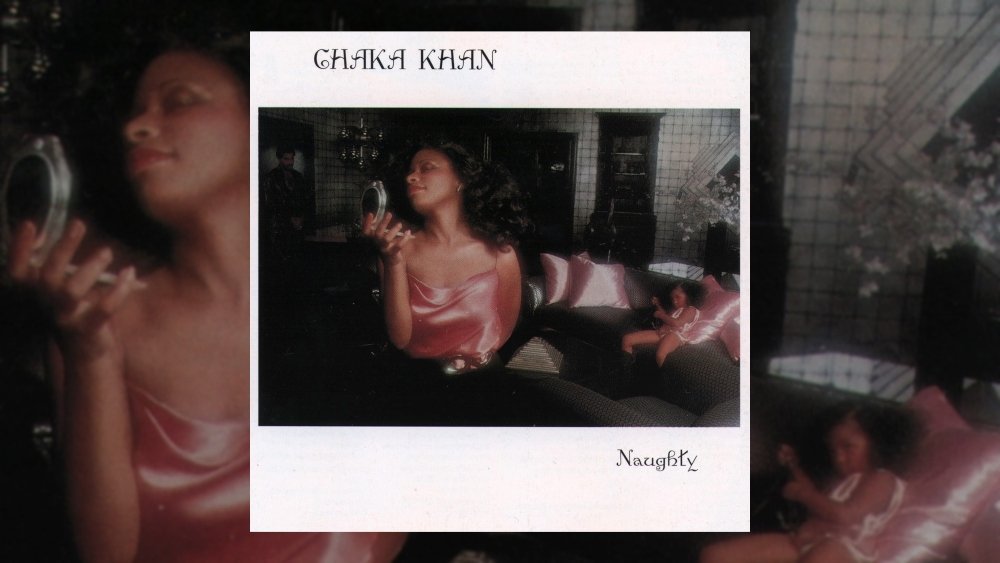Happy 45th Anniversary to Chaka Khan’s second solo studio album Naughty, originally released March 26, 1980.
Born Yvette Marie Stevens, Chaka Khan first came to the world’s attention in the early ‘70s as the lead singer of the legendary funk band Rufus. With an incredibly powerful voice, unique tone and a presence that couldn’t be bottled, it was inevitable that Khan’s star would prove to be anything but a fleeting thing in the night—she was the real deal. She still is.
Khan’s 1978 debut album Chaka not only provided a break from Rufus, but it also gave her the ability to stand on her own and assert her presence as one of music’s most dynamic stars. The lead single from the album, “I’m Every Woman” was an instant smash and to this day, it remains one of Khan’s most universally beloved songs. With Chaka and its hit single, Chaka Khan the solo artist had arrived.
Two short years after Khan’s solo debut, the singer released her much anticipated follow-up, Naughty. Released in March of 1980, the album found Khan rejoining forces with the late legendary producer Arif Mardin (they worked together on Khan’s debut) and together, they yet again created an incredible album that ushered in a new decade with a soulful, fresh funky sound. With Mardin in tow, Khan called on fellow musicians like bassist Anthony Jackson, The Average White Band, Saxophonist Michael Brecker and a myriad of others to help assemble her sophomore project.
Naughty opens with the Ashford & Simpson penned track “Clouds.” If there was ever an album that had an opening track that literally set the tone for what was to follow, Naughty was that album and “Clouds” most definitely is that track. The deliciousness and dramatic construct of this song is too good for words. A musical journey that lasts over four minutes and introduces disco to funk and then blends them, “Clouds” showcases Khan’s vocals placed on full display with the help of her sensational backing vocalists that included the legendary Cissy Houston and a young Whitney Houston. The validity, beauty and strength of this song is so underrated and such oversight needs to be adjusted.
Listen to the Album:
The album’s second song and incidentally also the second single, “Get Ready, Get Set” continues where “Clouds” left off. Providing a smoother groove, we are again reminded of Khan’s vocal prowess as she entices the listener further into her musical den. Khan’s version of “Move Me No Mountain” was the first time I heard this track, although both Love Unlimited and Dionne Warwick recorded the song in 1974 and 1975 respectively. This original version, whilst a firm favorite, would go on to serve as a favorite yet again when Soul II Soul rerecorded the song in 1992 with a clubbier, house-tinged flavor.
The funk that permeates throughout this album is unbelievably contagious. Whilst there are moments of relative calm ensconced in a funky type of balladry that Khan so effortlessly delivers (“Nothing’s Gonna Take You Away” and “So Naughty” come to mind), it is the more uptempo tracks like the unabashed ode to love “Too Much Love” that make this album completely and utterly about Khan. Steeped in sensuality, “All Night’s All Right” is the song that takes you from the dance floor to the bedroom, as Khan demands, “Mama's away / Daddy too / Me and you all alone / With nothing to do /All night's all right,” coupled with an electric violin providing a psychedelic backdrop, almost like a scene straight out of Tommy.
Albums like Naughty demonstrate how music can and does represent a moment in time. “What You Did” provides a bridge where disco and funk meet yet again with guitar solos and classic disco beats that remind us of the entrance into the 80’s, the burgeoning of electronica if you like. But it’s arguably the final two tracks on the album that solidify this whole journey and affirm Khan’s star power.
“Papillion (a.k.a. “Hot Butterfly”) was the album’s standout commercial hit, but along with another Ashford & Simpson penned tune “Our Love’s In Danger,” a new dimension of musicality was given center stage. Luther Vandross, along with Cissy and Whitney Houston, brought a vocal superiority to both tracks. Vandross, who originally sang “Hot Butterfly” with the band Bionic Boogie in 1978, also provided backing vocals on “Nothing’s Gonna Take You Away” and his sound can most definitely be heard and felt in all three of these soulful arrangements.
This album may just be Khan’s best when it comes to serving as a “total package.” Sure, some of Khan’s most well-known hits were to follow just a few short years later. But the cohesiveness and pre-star star power that was used on this album via some of music’s now legendary artists and musicians only serves to preserve the longevity and superb status this album achieved in 10 beautifully crafted songs, with one that Khan co-wrote (“What You Did”). This album most certainly earned and deserves the title of “legendary.”
LISTEN:
Editor's note: this anniversary tribute was originally published in 2020 and has since been edited for accuracy and timeliness.

